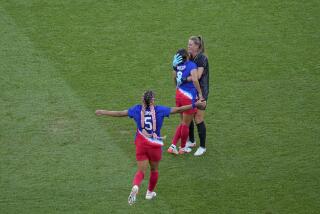For U.S. Women, Call This Title III
- Share via
ATHENS — They didn’t dance into separate corners of the court, they gathered in the middle.
They didn’t wave separate U.S. flags, they huddled together under one.
In the end Saturday, as heads became shoulders and jerseys swallowed jerseys, it was difficult to identify the parts, but easy to understand the whole.
This was an American team of women.
And, like nearly every other American team of women in these Olympics, these were champions.
“Women athletes have not been tainted,” said Tina Thompson, tears blotching her cheeks. “Money is still not a big issue for us, so you have to have a true passion to play the game, play it right.”
And play this U.S. women’s basketball team did Saturday, defeating Australia, 74-63, for an Olympic championship that completed a triple tiara.
In all three major team sports fielded by the U.S. in these 2004 Games, the women won gold medals.
In none of those sports did the U.S. men do the same.
American women here reminded us of a truth that has been lost all across America, somewhere between two-handed touch and six-year contracts, between T-ball and beanball.
There is no “my” in team. There is no “buy” in team.
From softball players carrying their coach, to soccer players carrying a farewell message, to basketball players carrying each other.
From Lisa Fernandez’s dugout meetings, to Julie Foudy’s midfield pleadings, to Dawn Staley’s sideline chats.
“For so many years, women in our country have been only too happy to play for the approval of applause,” said Vivian Stringer, U.S. assistant basketball coach. “Money-wise, they have made peanuts, so they play to make people happy, working hard and doing it the right way.”
Some might even say, perhaps unfairly, that there is no “guy” in team, but the American men didn’t hang around Athens long enough to dispute it, the men’s soccer and baseball teams not even qualifying for the Olympics, and the basketball team finishing third.
Add gold medals in women’s beach volleyball, and bronze medals in women’s water polo and synchronized swimming, and it was virtually a team sweep.
“There’s something good going on here,” Thompson said. “Something powerful.”
Call it the Title IX Olympics.
“The rest of the world is trying to catch up, but you have to understand, America just has more women athletes,” Australia’s Trish Fallon said. “Hundreds of thousands of athletes.”
Call it The-Only-Good-Thing-to-Come-Out-of-Atlanta Olympics, further fallout from the summer in 1996, when women’s team sports became cool.
“That’s when it started, when people started to see,” Thompson said. “We had focus, we had impact, people wanted to be part of it.”
These Olympics began, appropriately, with Staley carrying the American flag.
They will end today, appropriately, with Mia Hamm carrying the American flag.
In between, the women’s team sports events were not only the most frantic but the most fun.
These were the only team competitions here where folks freely waved American flags and started “USA!” chants.
“I think people appreciate the way we play here,” said Shannon Johnson, who had 12 points. “Nothing against the men, but we never underestimate any other team.”
These were also the only American competitions here where you rarely saw mental mistakes, and never collapses, and for good reason.
The veterans on the softball, soccer and basketball teams have been playing with each other for at least a decade, playing other national teams, doing everything the men’s teams cannot.
Staley and Lisa Leslie, for example, have been together on some form of the U.S. women’s basketball team for 15 years, playing a combined 393 games for our country.
This is why the softball team never flinched in giving up only one run here, why the soccer team survived, even though it was outplayed in the final, and why the basketball team overcame an early second-half deficit against Australia.
The women play for years, preparing for these moments. They know each other’s every move in these times. And they know it will never get any better than this.
“This is still the grandest stage for women,” Stringer said. “Guys get many opportunities back home. This is ours.”
And how they took it -- loudly, powerfully, altering more macho stereotypes, more folks willing to quit fighting like a man if, darn it, someone would only teach them how to throw like a girl.
Bill Plaschke can be reached at bill.plaschke@latimes.com. To read previous columns by Plaschke, go to latimes.com/plaschke.
More to Read
Go beyond the scoreboard
Get the latest on L.A.'s teams in the daily Sports Report newsletter.
You may occasionally receive promotional content from the Los Angeles Times.







